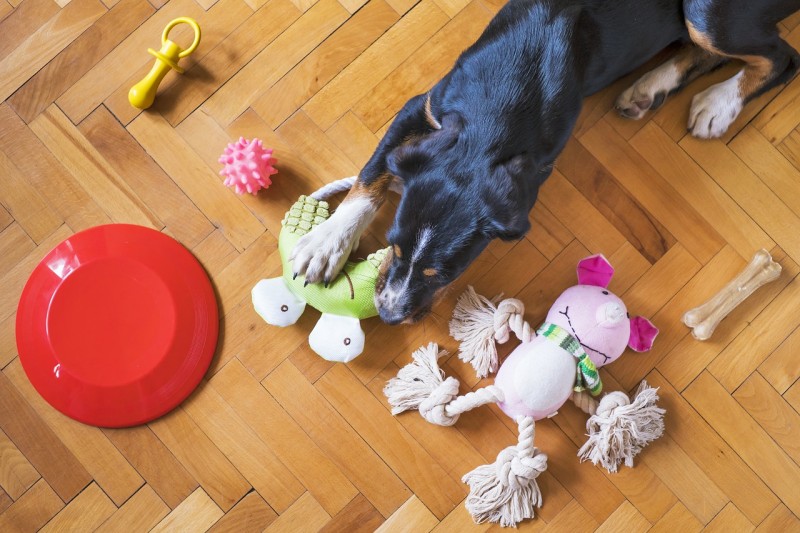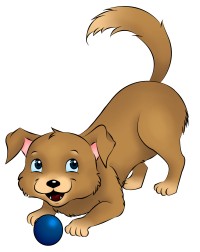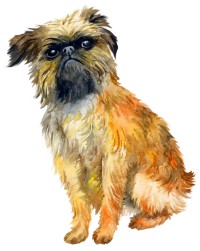Take Charge of Your Pup's Toys
By Michele Welton, Dog Trainer, Breed Selection Consultant, Author of 15 Dog Books

Is your floor littered with lots of dog toys? A tennis ball here. Two chew bones over there. A plush teddy bear on the sofa. Squeaky toys on the rug by the door.
Is that okay?
Sure, IF your pup....
- is not chewing anything else (like your furniture or belongings!)
- is respectful of you and your family
- and has no behavior issues
But I wouldn't advise leaving all those toys down at once. To maintain interest, I recommend rotating toys. Let your pup have a few toys for a few weeks. Then put them away and offer a different set.
 Rotating toys keeps your pup's mind open to accepting new things, which is a healthy attitude. Rotating toys also makes them seem new and exciting whenever you return them after an absence.
Rotating toys keeps your pup's mind open to accepting new things, which is a healthy attitude. Rotating toys also makes them seem new and exciting whenever you return them after an absence.
If your pup is a destructive chewer (meaning he's chewing up your stuff, too), he should NOT have a bunch of toys.
When the floor is littered with toys, a chew-happy pup might assume that everything is chewable.... including your belongings.
I give a destructive chewer only one or two toys, as tough and durable as possible. Nylabones® and Kong® toys are often good choices.
Having only a couple of toys makes it clear to a destructive dog that those two objects are the only things he is allowed to chew on.
Everything else he tries to pick up receives an "AH-ah" or "Leave it".
The good news is that most destructive chewers grow out of the habit with maturity. So at some point, you should be able to add more toys and begin rotating them for variety.
 If your pup has any behavior issues, he should NOT have a bunch of toys.
If your pup has any behavior issues, he should NOT have a bunch of toys.
Just as pups with behavior issues tend to be sleeping on their owners' beds or furniture, pups with behavior issues tend to have free access to toys, either scattered on the floor or in a dog-accessible toy box.
This presents us with a great opportunity! You see, along with sleeping spots and food, toys are a valuable resource to your dog.
Therefore, one of the best ways to establish the proper leader-follower relationship with a pup who is being disrespectful or acting out, is for you to control the toys.
With disrespectful pups, don't leave toys down all day and don't offer free access to a toy box. Free access to toys can create a dog who feels entitled.
Instead, you want the pup to discover that toys are privileges controlled by you. Make sure he watches you as you select one toy from YOUR toy shelf, which is not dog-accessible. Have him Sit, then hand it to him. After a short play session, make sure he watches you pick it up and put it back on YOUR shelf. This simple routine is surprisingly impressive to your dog!
 Pups who are possessive of their toys
Pups who are possessive of their toys
In my article on taking charge of your pup's food, I talk about resource guarding, which is a dangerous canine behavior problem. Dogs may resource-guard their food, toys, sleeping spots, even your lap!
Resource guarding typically starts with a dog hovering over something and growling when someone approaches or extends their hand toward it. Usually it gets worse and worse until the dog finally bites.
So if your pup is acting possessive of a toy, take that toy away as soon as you can do so safely. Put it away in a drawer. If he simply switches his guarding to a different toy, pick up every single toy for a full month while you continue implementing my training program.
If you reach a point where you think you've been successful in establishing the proper leader-follower relationship, you can try reintroducing one toy and see what happens.
My best-selling books – now available FREE on my website
 Respect Training For Puppies: 30 seconds to a calm, polite, well-behaved puppy is for puppies 2 to 18 months old. Your puppy will learn the 21 skills that all family dogs need to know. Click here to read for free.
Respect Training For Puppies: 30 seconds to a calm, polite, well-behaved puppy is for puppies 2 to 18 months old. Your puppy will learn the 21 skills that all family dogs need to know. Click here to read for free. Teach Your Dog 100 English Words is a unique Vocabulary and Respect Training Program that will teach your adult dog to listen to you and do what you say. Click here to read for free.
Teach Your Dog 100 English Words is a unique Vocabulary and Respect Training Program that will teach your adult dog to listen to you and do what you say. Click here to read for free. 11 Things You Must Do Right To Keep Your Dog Healthy and Happy helps your dog live a longer, healthier life. Get my honest advice about all 11 Things before you bring home your new puppy, because some mistakes with early health care cannot be undone. Click here to read for free.
11 Things You Must Do Right To Keep Your Dog Healthy and Happy helps your dog live a longer, healthier life. Get my honest advice about all 11 Things before you bring home your new puppy, because some mistakes with early health care cannot be undone. Click here to read for free.
